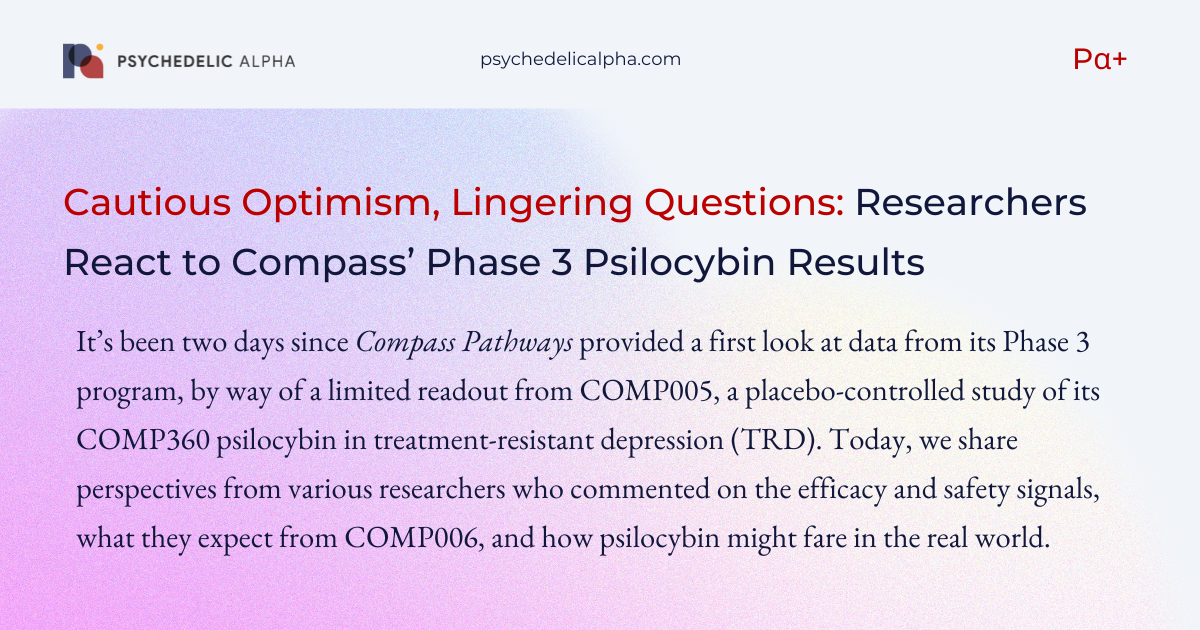In many cases, researchers commented on what some have deemed to be an underwhelming change in MADRS scores between the active and placebo arms. Some weighed in on the data itself, others on the field’s (and the stock market’s) reaction to it, and others still focused on their perception of current scales as inadequate in capturing the true impact of psychedelic-based therapies on patients’ lives.
Chair and Professor at the Department of Neuropsychiatry at Keio University School of Medicine in Tokyo, Hiroyuki Uchida, told us that the results “represent a significant milestone in the development of novel treatments for TRD”, describing the MADRS delta as “clinically meaningful, especially in a patient population that has limited therapeutic options.”
Still, the recent Psychedelic Alpha interviewee said that the “significant drop in Compass Pathways’ share price following the announcement” suggests that “some people may have perceived the degree of improvement as modest.” He said that understanding the demographics and disease background of participants, as well as actual score changes in both arms, “will help us better understand the nature and magnitude of the placebo response in this setting”, especially given variable placebo responses in psychedelic research.
Despite being ‘cautiously optimistic’, Director of the Translational Psychedelic Research (TrPR) Program at UCSF Joshua Woolley hoped the field would refrain from drawing too many comparisons to Spravato and instead aim for “stronger evidence” and not repeat “the same ambiguities” associated with its approval. “Spravato’s approval was itself controversial, and questions remain about its clinical benefit”, he told us.
“The market’s response, which will undoubtedly be the focus of many analyses, seems to reflect investor hunger for miracles, and what they got is a solid milestone for efficacy, safety or approvability”, Stanford’s Boris Heifets told us. But don’t fret, his lab will “keep working on that elusive silver bullet for mental health”!
University Medical Center Groningen Postdoc Joost Breeksema, meanwhile, told us that he was not hugely impressed by Compass’ results. “It is nice that the differences between psilocybin and placebo are statistically significant”, he said, “but my real curiosity is to what ‘clinically meaningful’ actually means.” The between-group delta is smaller than that between the 1 and 25 mg arms in the company’s Phase 2b trial, he added, wondering whether we are now getting closer to appreciating “the real effect size of this Compass-style therapeutic intervention”, now that we’re working with larger patient samples.
“We’re just speculating at this point”, he went on, “but I think most folks had been hoping for more compelling efficacy data.”
On MADRS more generally, Breeksema complained that it can obscure the “concrete effects” that an intervention like psilocybin therapy might have on patients’ quality of life. “A reduction in MADRS scores does not always map neatly onto relevant changes in someone’s life,” he told us, adding: “and besides, the mean may cover huge differences between – on the one hand – patients who have a radically different outlook on life thanks to a successful and transformative experience versus patients who had zero response and those who actually got worse. Would love to have a better understanding of that.”
University of Zurich researcher and clinical psychologist Helena Aicher’s comments chimed with Breeksema’s line of thinking. “Since human beings are complex and the processes that psychedelics often catalyse are so too,” she told us, “I’m convinced that it would be valuable to look at other measures beyond pure symptom reduction of depression, even though I acknowledge these are important in the framework of medical approval.”
She said it would be helpful to understand what participants that received COMP360 did in their daily life post-treatment versus those who received placebo, for example (note that, in an interview with Psychedelic Alpha, Chuck Raison described how a technology called ‘the EAR’ is being employed in the OPTIMIZE psilocybin study to do precisely this), though she acknowledged that this is by no means specific to Compass’ study (“Given the biomedical approach that is necessary to approve psychedelics as medications, the study follows the required procedures and shows promising results”, she said.).
In a view surely held also by Breeksema, who has published qualitative research on patients’ experience with drugs like psilocybin and esketamine, Aicher added: “I’d be interested in hearing more patient perspectives, especially since individual processes are complex and usually cannot easily be understood with a reductionist view.” Still, she again accepted that what is expected of drug developers to achieve regulatory approval looks different…


